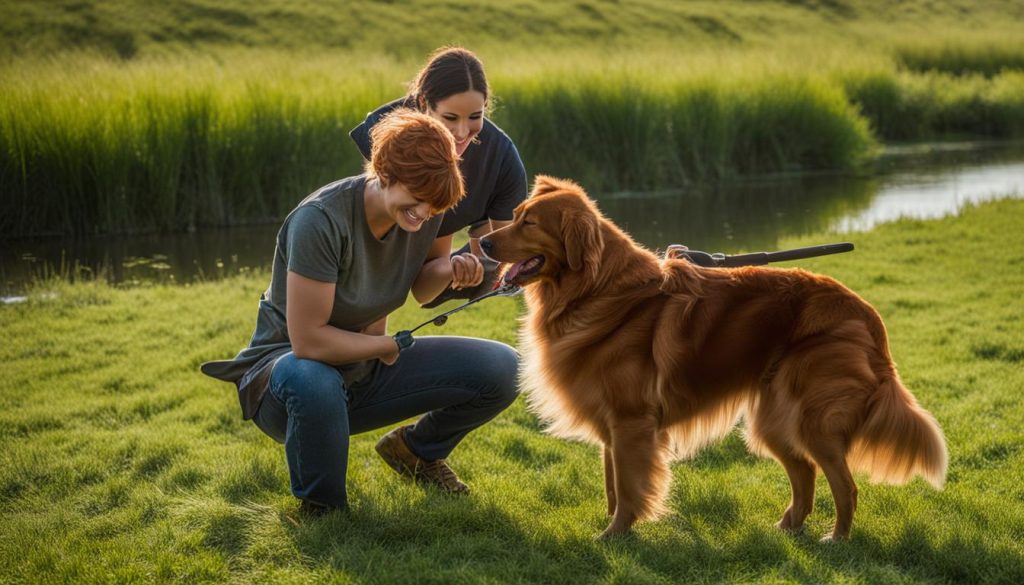The Nova Scotia Duck Tolling Retriever, with its vibrant energy and sharp intellect, epitomises the pinnacle of canine breeding expertise. It emerged in the tranquil environs of Nova Scotia, Canada, during the early 19th century and quickly distinguished itself. Famed for both its adeptness in retrieving and its amiability as a familial companion, it radiates an archetype of the ideal dog. Its sturdy build is a product of meticulous breeding for duck tolling, yet it flourishes on warm, affectionate interactions, aligning perfectly with the preferences of both hunters and family units.
Distinguished by a lustrous, golden-red coat and a tail that seems perpetually in motion, this breed radiates a zest for life that necessitates vigilant care, especially in adapting exercise regimens to match its exuberant energy. To safeguard the breed’s health, owners must balance rigorous physical activity with fostering its natural sociability. This equilibrium guarantees the emergence of a content and sociable canine friend.
This comprehensive guide is designed to equip potential owners with crucial insights into the breed, covering the Nova Scotia Duck Tolling Retriever’s history, unique character, and essential needs. It aims to enable enthusiasts to wholly embrace and provide for the dynamic existence of this adaptable dog.
Key Takeaways
- Duck Tolling Retrievers possess a friendly and intelligent temperament, making them excellent family pets.
- Originating from Nova Scotia, the breed is historically acclaimed for its ability to lure and retrieve waterfowl.
- Proactive puppy care, including socialisation and training, is crucial for this breed’s development.
- Maintaining the Duck Tolling Retriever’s coat and health necessitates regular grooming and veterinary check-ups.
- Owners must address the considerable exercise needs of the breed to ensure their physical and mental well-being.
Understanding the Duck Tolling Retriever: Breed Highlights and Temperament
The Duck Tolling Retriever, widely referred to as the Toller, is distinguished by its unique traits in the dog realm. Highlighting its appeal, the Toller showcases an invigorating dynamism paired with unparalleled intelligence, facilitating swift and adept learning. This breed’s robust persona is complemented by a disposition inclined towards eagerness to please. Such characteristics render the Toller an admirable ally in both vigorous endeavours and serene domestic environments.

Characterized by a playful essence, Tollers exhibit a degree of alertness suited for various pursuits, including hunting and agility competitions. This innate playfulness is counterbalanced by a loving, affectionate nature that fosters deep familial bonds. Acknowledging their temperament necessitates an appreciation for their demand for consistent physical and intellectual stimulation. Absence of such engagement often propels them into mischievous activities to dispel excess energy.
While the breed typically enjoys robust health, meticulous breeders counsel potential owners to remain cautious of certain inheritable conditions. Adhering to regular health assessments mitigates prevalent issues, safeguarding the breed’s agility and overall wellbeing.
| Breed Trait | Description |
|---|---|
| Energy Levels | High, requiring regular exercise and mental stimulation |
| Intelligence | Highly intelligent, adept at problem-solving |
| Temperament | Affectionate, playful, and eager to please |
| Training | Exhibits strong response to positive reinforcement, relishes structured tasks |
| Health Concerns | Prospective owners advised to inquire about hip dysplasia, progressive retinal atrophy, and genetic screenings |
In essence, breed insights underscore the Duck Tolling Retriever’s spirited demeanour and inclination towards an engaging, social existence. Potential owners should not only cherish these qualities but also engage in active stewardship of their Toller’s health and zest for life, through attentive care and cognizance of their inherent zest for activity.
Caring for Your Duck Tolling Retriever: Grooming and Training Essentials
Ensuring your Duck Tolling Retriever’s well-being involves meticulous grooming alongside consistent training. A thorough grooming regimen enhances the dog’s natural qualities. Simultaneously, effective training establishes obedience and social skills, crucial for their growth.

How to Groom Your Toller: Tools and Techniques
Grooming your Duck Tolling Retriever transcends mere physical appearance; it’s crucial for maintaining coat and skin health. Routine brushing prevents matting in their dense, water-resistant fur and spreads essential skin oils, giving the coat a healthy shine. To navigate grooming effectively, owners need appropriate tools such as slicker brushes, metal combs, and de-shedding implements.
| Grooming Task | Tool | Frequency |
|---|---|---|
| Brushing | Slicker Brush | 2-3 times a week |
| Detangling | Metal Comb | As needed |
| De-shedding (Seasonal) | De-shedding Tool | Weekly during shedding season |
| Bathing | Dog-specific Shampoo | Every 1-2 months or as needed |
| Ear Cleaning | Cotton Balls and Ear Cleaner | Weekly |
| Dental Care | Dog Toothbrush and Toothpaste | Daily |
Training Your Duck Tolling Retriever: Obedience and Socialisation
Beyond grooming, adhering to training advice for your Duck Tolling Retriever promotes obedience and encourages socialisation. Thanks to their intelligence and desire to please, Tollers excel with positive reinforcement strategies such as praise, treats, and playtime.
- Initiate obedience training early to instil fundamental commands like sit, stay, and come.
- Promote socialisation early to familiarise your Toller with diverse settings, people, and other pets.
- Integrate training into daily activities to enhance mental stimulation and consolidate learning.
Following these training recommendations not only cultivates a well-behaved Duck Tolling Retriever but strengthens the pet-owner relationship.
Note: Always consult a professional dog trainer for personalised guidance tailored to your dog’s unique personality and needs.
Ensuring a Healthy Life: Duck Tolling Retriever Exercise Needs and Health Concerns
Duck Tolling Retriever owners must meticulously oversee their pets’ exercise regimes and potential health conditions. It is imperative to find equilibrium between sufficient physical exercise and vigilant health monitoring to safeguard the welfare of these cherished canines.
Promoting Good Health: Recognising and Preventing Common Health Issues
Whilst typically healthy, Duck Tolling Retrievers are genetically inclined towards certain ailments. It is crucial to identify and mitigate health issues such as hip dysplasia, progressive retinal atrophy, and cardiac problems early. Regular vet consultations and specific health assessments significantly contribute to maintaining your Toller’s peak condition.
Vigilance in your pet’s health and early action upon signs of distress are fundamental in preventing and efficiently managing health problems.
Puppy care protocols for Tollers should prioritise balanced nutrition and moderate physical activity to safeguard developing skeletal structures. It falls upon pet owners to be well-informed about the breed’s prevalent health concerns. This knowledge ensures utmost care for their furry friends.
Exercise Requirements: Keeping Your Toller Active and Engaged
Duck Tolling Retrievers’ need for exercise is considerable. These lively dogs flourish on vigorous activities that resonate with their innate behaviors, such as retrieving and swimming. Adequate exercise not only supports their physical health but also wards off behavioral issues caused by ennui or insufficient stimulation.
- Puppy playtimes should be brief yet frequent to shield their developing skeletal system.
- Introducing swimming and retrieval games as they mature enhances both physical and cognitive growth.
- Mature Tollers necessitate comprehensive exercise plans, embracing lengthy jogs, treks, and agility work.
Embedding these advised activities into your Toller’s daily regimen satisfies their exercise needs. It ensures they remain mentally engaged and physically vigorous, diminishing health problem risks.
It is essential to note that mental engagement, alongside physical activity, is crucial. Intelligent breeds like Tollers demand challenges that stimulate both mind and body.
In summary, the Duck Tolling Retriever epitomises a blend of energy and susceptibility. Fulfilling their exercise requirements and being vigilant towards health concerns are essential for ensuring a vibrant and fulfilling life for these smart and loving dogs.
Conclusion
In summarising this comprehensive guide, the Duck Tolling Retriever is identified as an exceptional companion for the active. It is a dog marked by vitality and intellect. We have delved into the breed’s specifics, highlighting attributes that distinguish it as a preferable option for both families and individuals. Exhibiting a sociable demeanor, the Toller thrives amidst human interaction, becoming an integral family member.
Puppy care for the Duck Tolling Retriever requires unwavering commitment, foundational for a well-adjusted adult. Attention to grooming and training is imperative for their overall well-being. These practices underline the dedication needed to preserve their mental and physical health.
The importance of regular grooming is paramount, enhancing the Toller’s appearance and health. Obedience training, combined with early socialisation, moulds these dogs into adaptable, well-mannered adults. Their need for exercise surpasses that of many breeds, demanding engagement in activities like retrieving and swimming.
Embracing a Duck Tolling Retriever brings immense joy but also significant responsibility. Owners must be aware of the rigorous care and exercise these vivacious canines need. The breed information provided aims to assist in understanding and supporting this breed’s requirements, ensuring a fulfilling life within their new families. In essence, the Toller transcends the pet category, evolving into a dynamic, loyal companion that enriches lives with happiness, activity, and companionship.
FAQ
What are the key characteristics of a Nova Scotia Duck Tolling Retriever?
Known also as a Toller, this breed exhibits medium size, power, and agility. It is distinguished by a fox-like visage, a dense, water-repellent coat, and a playful yet intelligent demeanour. Originally bred for hunting, they provide affection and good nature, making splendid family companions. Their high energy and zeal for activities like retrieving and swimming are noteworthy.
How important is puppy care for Duck Tolling Retrievers?
For Duck Tolling Retrievers, early puppy care is paramount, influencing their overall physical and mental development. It encompasses early socialisation, nutrition suited to their breed, routine veterinary check-ups, and the commencement of obedience training. A secure environment for exploration and learning, coupled with abundant affection and attention, cultivates their social abilities.
Can you describe the temperament of a Duck Tolling Retriever?
The Duck Tolling Retriever is celebrated for its friendly and affectionate nature. Intelligent and keen to please, they excel in familial settings, showing amiability towards children and other animals. Possessing a blend of outgoingness and playfulness, they remain alert and vigilant. They flourish with human interaction and necessitate considerable mental and physical activity for their contentment.
What health issues should potential Duck Tolling Retriever owners be aware of?
Despite their general robustness, Duck Tolling Retrievers may be susceptible to genetic conditions like hip dysplasia, progressive retinal atrophy, and certain cardiac issues. Prospective owners must recognize early symptoms and adopt preventative strategies. Regular veterinary screenings and check-ups are advised to ensure the breed’s enduring health.
What grooming needs does a Duck Tolling Retriever have?
With a dense, water-repellent double coat, the Duck Tolling Retriever’s grooming is essential. Routine brushing is recommended to mitigate tangles and shed hair, maintaining coat health. Baths should be infrequent to preserve natural oils, whilst ear cleaning and dental care, alongside regular nail trimming, are indispensable for their well-being.
Are there specific training tips that work best for Duck Tolling Retrievers?
This breed thrives under positive reinforcement, valuing praises, treats, and play. Training, characterized by consistency, patience, and kindness, suits them best. Their intelligence and playful nature suggest that integrating games into training sessions is beneficial. Early socialisation and engaging them in new tasks enhance their mental stimulation.
What type of exercise does a Duck Tolling Retriever need?
As a high-energy breed, Duck Tolling Retrievers necessitate vigorous daily exercise. Activities such as walking, running, swimming, and fetching fulfil their physical demands. Participation in dog sports and interactive play also serves as excellent outlets for their energy. Ensuring both mental and physical engagement is crucial to avert boredom and behavioural problems.

